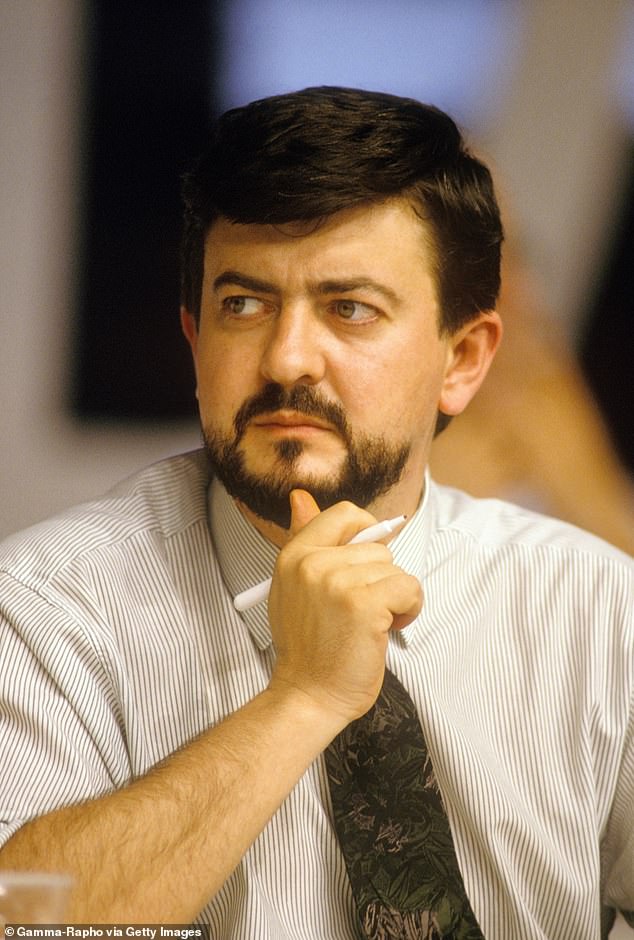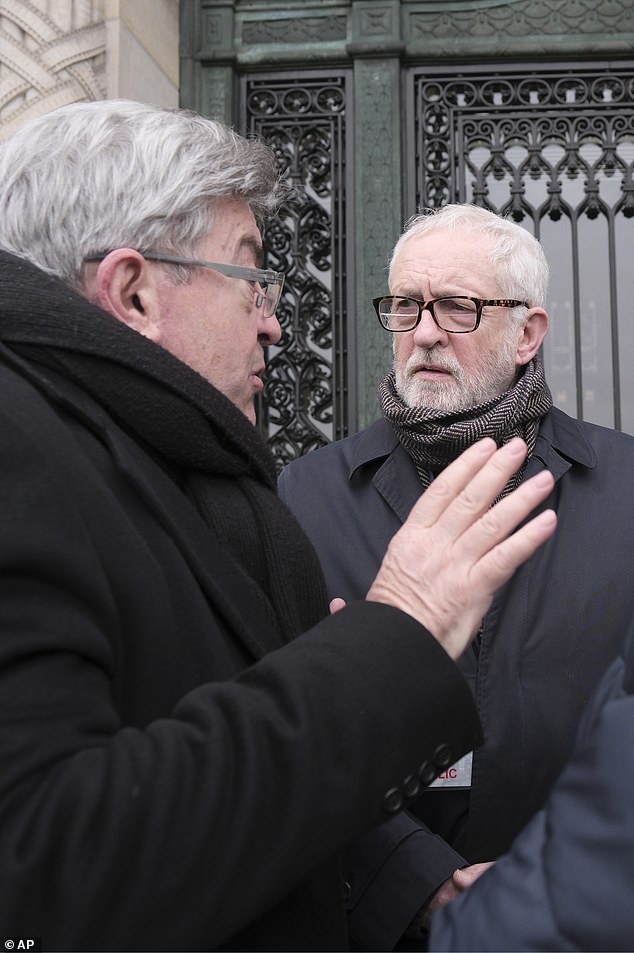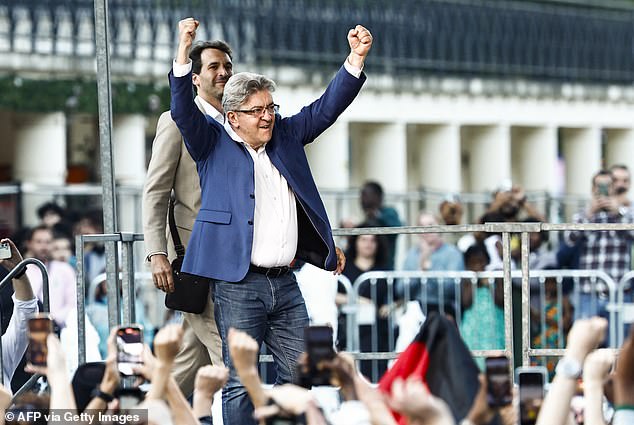The most dangerous clown in France: Crackpot far-Left policies that would bankrupt the country. A 90% top tax rate. A burning hatred of NATO. Yet Jean-Luc Melenchon is now on the brink of becoming PM…
An older man with glasses in a black leather jacket stomps up the stairs to his office and confronts the bearded plainclothes police officer guarding the door.
He stands directly across from the officer, his face inches from the other man’s, and begins to curse.
“I’m telling you, you can’t stop me from coming into my office,” he screams in anger. “We are not thugs or bandits. Go do your job as a policeman! I am the republic! I am a politician! Get out of my way and open this door!”
The star of this epic rampage, which erupted in 2018 when police raided his office on allegations of the improper use of political funds – and was captured for posterity on YouTube – was Jean-Luc Melenchon, the leader of a far-left party called France Unbowed.
After his parliamentary grouping won more seats than any other party in the left-wing coalition that emerged as the largest bloc after last weekend’s elections, Melenchon is a likely candidate to become France’s next prime minister. It’s a prospect that should terrify anyone who has France’s best interests at heart.
Jean-Luc Melenchon, the leader of a far-left party called France Unbowed, is a contender to become France’s next prime minister

Melenchon first won elected office in 1983 when he became a municipal councilor in Massy, a town just outside Paris
Because Melenchon – who received a three-month suspended prison sentence and an €8,000 fine after the unsavory confrontation outside his office – is France’s most dangerous clown, with the bombast (and waistline) of Kim Jong Un.
It is hard to see how he can be taken seriously at first. But he is a mesmerizing demagogue and the snake oil he sells appeals to his core constituency, concentrated in densely populated suburbs with grim social housing and large immigrant populations. As in Islington, he is also voted for by many champagne socialists.
They all love his passionate support for Palestine, his intention to open the French borders and his instinctive hatred of the police.
Speaking of his intention to immediately lower the retirement age to 60, which would bankrupt the state, Melenchon warned that any deputies who dare to vote against it “will be named, registered and handed over to the people. That’s democracy. I hope they won’t be deported to a reform camp.” Was he joking? He’s not known for his sense of humor.
If Melenchon had his way, he would turn France into a European Venezuela, triggering an exodus of wealthy citizens seeking to flee his proposed 90 percent top tax rate (unless they are deterred by his exit taxes on anyone who tries to leave).
Melenchon’s positions are a toxic combination of communism, alliances with militant Islamists and eco-radicals. He stands for higher wages and price controls on food and fuel, while harboring a burning hatred for America, NATO and Germany.
It is a manifesto crazier than one of those absurd French farces by the national playwright Molière.
But now, through the slings and arrows of outrageous fate, this mad rabble-rouser, who is fond of Mao jackets and who cultivates the image of a ‘man of the people’ despite his fortune of 2.5 million euros, demands the key to the Hotel Matignon, the headquarters of the French Prime Minister.

‘Brothers in arms’ Jeremy Corbyn and Melenchon, 72, speak outside the International Court of Justice in The Hague in January this year.

Melenchon was given a three-month suspended prison sentence and a fine of €8,000 (£6,700) after an unsavoury confrontation outside his office in 2018
How did this despicable agitator manage to rise to the second position of the highest office in the land?
A choirboy in his youth, Melenchon, a vigorous 72, is – like his brother-in-arms Jeremy Corbyn – a lifelong political member who, apart from a brief stint as a teacher as a young man, has never held a proper job. From 1972 to 1976 he was a member of the Internationalist Communist Organisation (OCI), a Trotskyist political party, after which he joined the Socialist Party to form the Left Party, a coalition allied with the French Communist Party.
Melenchon won his first elected office in 1983, when he became a municipal councilor in Massy, a town just outside Paris. Three years later, he was elected to the Senate, the upper house of the French parliament, and – surprisingly given his later unreliability – he served as “Minister of Vocational Education” for Lionel Jospin from 2000 to 2002.
In 2009 he was elected to the European Parliament, where he served as an MEP for eight years.
In 2012, he made the first of three attempts to win the French presidency, winning just over 11 percent of the vote.
After founding France Unbowed in 2016 and installing himself as supreme leader, he finished fourth in the 2017 presidential election, with 19.6 percent of the vote. He made his third and final presidential bid in 2022, winning 22 percent of the vote but failing to reach the second round.
It is fair to say that in his entire political career he has achieved nothing other than a reputation as a bully and a bigot – and yet he still gulps down a salary and allowance package of €10,000 a month, four times the average salary.
Now his hour may finally have come. Melenchon finds himself in the midst of a struggle to reform a credible government – amid the mess left by President Emmanuel Macron’s incomprehensible decision to call early elections, and after the surprise performance of Marine Le Pen’s far-right Rassemblement National in the European Parliament elections.
Repairing the political devastation he has wrought is an operation of mind-boggling complexity and one that may not be possible. Fifteen factions are now represented in the National Assembly and they do not work well together.
Forming a coalition to replace the government Macron has ousted is like solving a Rubik’s cube while blindfolded. And God help France if Melenchon ever emerges as the winner.
Macron has been Melenchon’s dimwitted henchman. Macron let him into his tent. Now he refuses to leave. But despite the bombast, Melenchon’s far-left supporters actually lost ground in the final results after Macron’s clumsy election campaign, winning just 11 percent of the vote (to Le Pen’s 37 percent) and falling from 77 to 74 seats in the 577-member assembly. His belief that he has won some kind of mandate is symptomatic of his boundless self-absorption.
Melenchon would plunge France into the mother of all economic, social and political crises, but in his usual immoderate way, he threatens anyone who defies him. If he does not get power, he vows to send his followers into the streets.
Meanwhile, Marine Le Pen – who received a higher percentage of the vote in France than Keir Starmer in Britain – has been banished to the opposition.
But if Macron’s intention was to destroy her, he has failed. She has proven time and again that whatever doesn’t kill her makes her stronger.
What emerges from the machinations in Paris could be a technocratic government, running day-to-day affairs but with no legislative agenda. Or a kind of benevolent national government with all the talents, which seems more of a dream than an immediate prospect, given the egos involved.
The alternative is an unstable coalition with a shelf life of perhaps weeks or days.
It is sincerely hoped that, however much France seems to have suffered the nervous breakdown I have long predicted, cooler heads will prevail. And while a new order is emerging, Jean-Luc Melenchon must not be allowed anywhere near it.
